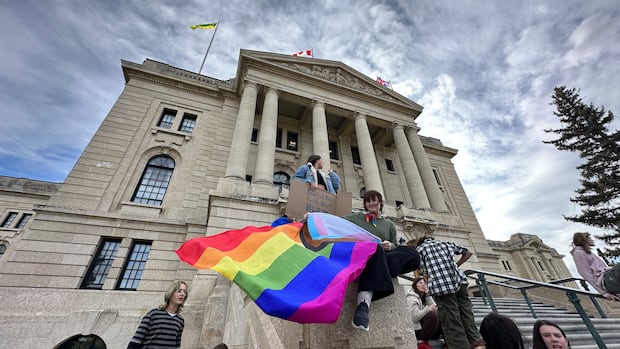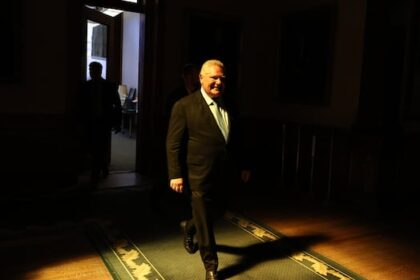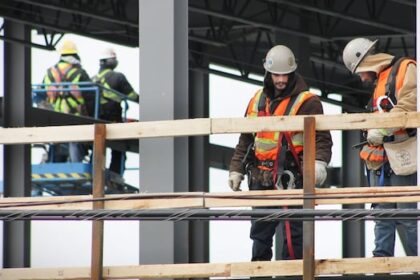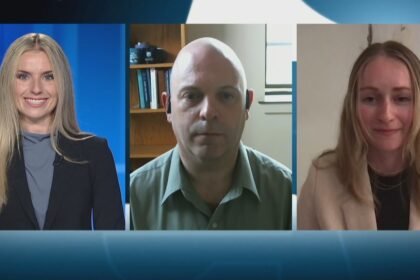SaskatchewanNo date has been set for the court to hear the cross appeals from the provincial government and UR Pride on the province’s school pronoun law, which prevents children under 16 from changing their names or pronouns at school without parental consent.Law prevents children under 16 from changing their names or pronouns at school without parental consentCBC News · Posted: Nov 06, 2025 10:21 AM EST | Last Updated: 9 hours agoListen to this articleEstimated 5 minutesThe audio version of this article is generated by text-to-speech, a technology based on artificial intelligence.Saskatchewan’s school pronoun law prevents children under 16 from changing their names or pronouns at school without parental consent. (Kirk Fraser/CBC)The president of the Saskatchewan Teachers’ Federation says she hopes the Supreme Court will bring clarity to the province’s pronoun law, after the country’s highest court said it will hear appeals on it.The law prevents children under 16 from changing their names or pronouns at school without parental consent, which Samantha Becotte said puts teachers in a difficult position.“We continue to advocate for the government of Saskatchewan to repeal Bill 137 and ensure that teachers have that professional autonomy,” she said. Teachers should be allowed to use their professional judgment to be able to create safe learning spaces for all students in Saskatchewan, said Becotte.No date has been set for the court to hear the cross appeals from the provincial government and UR Pride, an 2SLGBTQ+ group in Regina.Premier Scott Moe’s Saskatchewan Party government introduced the rule as a policy in 2023, arguing parents should be involved in decisions their children make at school.Lawyers for UR Pride challenged the rule in court, arguing it violates Charter rights and causes irreparable harm to gender diverse youth.WATCH | Supreme Court to weigh in on Saskatchewan’s pronoun law:Supreme Court to weigh in on Saskatchewan’s school pronoun lawThe Supreme Court of Canada announced Thursday it will hear appeals from the province of Saskatchewan and UR Pride regarding the province’s school pronoun law, which prevents children under 16 from changing their names or pronouns at school without parental consent. A judge granted an injunction to halt the policy. But a month later, the province put it into law and invoked the notwithstanding clause, allowing it to override certain Charter rights for five years.The province argued the challenge should be thrown out because it invoked the clause, but Saskatchewan’s Court of Appeal ruled earlier this year it can continue.It said the court can’t strike down the legislation because of the notwithstanding clause, but it can issue a declaratory judgment on whether the law violates constitutional rights.It also ruled UR Pride can still argue the law be struck down, because the clause wasn’t applied to Section 12 of the Charter — the right to be free from cruel and unusual treatment. The province cited other sections when it invoked the clause.The group and the province both appealed and asked Canada’s highest court to expedite the case to be heard alongside a challenge of a Quebec law that prevents public sector workers from wearing religious symbols on the job.Quebec also invoked the notwithstanding clause in its law.Lawyer wants to see government defend lawAdam Goldenberg, a Toronto lawyer representing UR Pride, said the law violates Charter rights and causes irreparable harm to gender diverse youth. He said the case is about forcing the government to defend the law with evidence.“If the government has made the unfortunate, I would say, cowardly, decision of invoking the notwithstanding clause rather than even seek to defend the constitutionality of its law in court, at least those young people still deserve an opportunity to convince a judge,” said Goldenberg.Goldenberg said it’s important for the Supreme Court to hear from gender diverse youth.Louis-Philippe Lampron, a constitutional law professor at Université Laval in Quebec, said the fact the Supreme Court is hearing the case shows the evolution of Canadian law and highlights how some provinces are courting populist sentiment. “Those populist movements are attacking the legitimacy of courts to invalidate some laws adopted by legislatures,” he said.Lampron said the notwithstanding clause may be used by the government as a way to fuel the fire of those populists, but he said at least the court challenge could put pressure on legislatures to not use the clause so lightly.The case in AlbertaA similar legal battle is brewing in Alberta.Premier Danielle Smith’s government invoked the notwithstanding clause last week to shut down a provincewide teachers strike and shield its back-to-work bill from legal challenge.Also in Alberta, a government memo obtained by The Canadian Press in September indicates Smith’s government plans to use the notwithstanding clause in three pieces of legislation policing school pronouns, female sports and gender-affirming health care.Those laws have already passed but face challenges.Alberta government promises to fight for school pronoun law amid legal challengePart of the law banning doctors from providing gender-affirming health care to those under 16 is on hold. A judge ordered a temporary injunction earlier this year, but Alberta is fighting that ruling, arguing it was premature.Another bill requires youth to get parental consent to use different names or pronouns at school, and a third bans transgender girls from amateur female sports.Smith has said publicly no decision has been made on whether to invoke the notwithstanding clause but adds her government may have to because it could take years for courts to resolve the issue.With files from Jeremy Warren and The Canadian Press
Sask. teachers hope for clarity after Supreme Court agrees to hear school pronoun appeal











